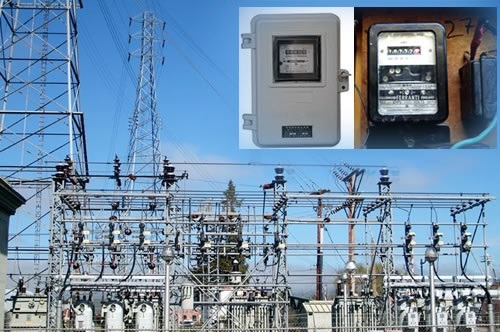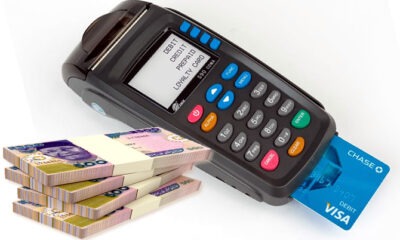Business
Boosting Local Capacity In Meter Production: How MOJEC Encourages Local Content Capacity
Published
2 years agoon
By
Editor
By Segun Olabode, Lagos
The Ministry of Power has become the latest key sector of the economy to work towards replicating the success achieved with the implementation of Nigerian Content in the oil and gas industry to ensure that ongoing transformation in the sector and massive investments by governments and private sector entities are steered to develop the local supply chain and encourage indigenous manufacturing.
According to Section 3(2) of the Act, exclusive consideration is given to indigenous Nigerian service companies that demonstrate ownership of equipment, Nigerian personnel, and the ability to execute work on land and swamp.
Indigenous meter manufacturers have not been able to produce adequate meters, which indicates the current production capacity in this sector, thereby placing unmetered Nigerians in perpetual wait to possibly no end. Meter manufacturers, like other industrial manufacturers, have faced challenges ranging from retrogressive port systems, foreign energy crises, multiple taxations, and high energy costs.
In its bid to mollify these challenges, MOJEC International Limited, Nigeria’s leading manufacturing company and the largest meter manufacturer in Sub-Sahara Africa, moved into boosting the local capacity of meter production.
The organization is putting a lot of effort into place to bridge the metering gap of over six million unmetered consumers by expanding and boosting its capacity in metering production, leveraging on its wealth of technical and financial experience in the local production of electric meters, thereby demonstrating its robust contribution to the development of local content in the Nigerian power sector.
Metering requires a significant amount of effort in both production and logistics; it is not as simple as purchasing a mobile phone and having it work as soon as a sim card is inserted. Metering the Nigerian populace has been an upheaval in the National Electricity Supply Industry (NES). There have been several mass metering intervention programmes by the Federal government and the Nigerian Electricity Regulatory Commission (NERC) since the inception of the electricity sector reform under the administration of former President Olusegun Obasanjo to bridge the metering gap.
READ ALSO: How MOJEC Is Facilitating Federal Government’s Mass Metering Agenda
The majority of these interventions were funded by the Federal Government, which provided direct funding to selected meter companies to import and roll out prepayment meters to electricity consumers. Also provided by the Federal Government were monetary and fiscal incentives such as duty waivers, tax waivers, duty reductions, and concessional funding to local meter assemblers to stimulate the assembling of meters in Nigeria.
Before this time, there were huge factors affecting the local production of meters, as all the components for metering were imported and importation logistics were a major challenge. Getting cargo across the ports comes with challenges. Also, the lack of patronage by distribution companies was a challenge to local manufacturers.
Currently, MOJEC meters are smart and low-voltage city-operated meters, ranging from single-phase to three-phase meters. They are for personal and industrial use. They could be post-paid or pre-paid.
In order to reduce metering gap in Nigeria, MOJEC under its Mobile MAP initiative has continued to push to get more Nigerians metered through its meter penetration and partnership with DisCos across regional areas in the country.
This move would see customers provided with meters within 24 hours, also preventing them to fall prey of extortion from installers in the bid of helping them secure a meter.
MOJEC, as an industry leader in metering technology development, has reached a significant milestone in the local production of smart meters. Apart from manufacturing electricity meters, MOJEC is also in the business of manufacturing water and gas meters.
It is worthy of note that MOJEC’s painstaking effort in meter production has been able to help propagate the objectives of the FGN’s agenda, which include: increasing
Nigeria’s metering rate; increasing local meter manufacturing capacity to strengthen the local meter value chain; creating jobs in the local meter value chain, and supporting Nigeria’s economy by eliminating erratic billings.
In 2020, the Federal Government initiated the National Mass Metering Program in partnership with indigenous meter manufacturers, including MOJEC, following its demonstrated ability to boost the capacity and production of meters locally while hiring and equipping Nigerians with the requisite skills required in the electricity sector.
The government, through NERC, has commended MOJEC for the quality of infrastructure and facilities put in place to support the Federal Government’s intervention Initiative.
The NERC chairman, Professor James Momoh, stated that MOJEC has demonstrated the capacity to support the effort in bridging the metering gap and urged the company to keep working to support the Federal Government and NERC in providing best-in-class smart meters for consumers.
READ ALSO: Precise Platforms Launches Research, Intelligence Outfit
The meter asset provider program is an initiative of the Federal Government under the Ministry of Power and the Nigerian Electricity Regulatory Commission to bridge the metering gap to track the supply of meters to distribution companies and other customers.
MOJEC Meter Company pioneered the concept of smart metering technology in Nigeria by setting up a state-of-the-art electricity meter plant in the country with a production capacity of over 3million meters annually designed to handle the demands of energy customers.
MOJEC manufactures and supplies different types of meter ranging from single-phase meters, three-phase pre-payment meters, whole current meters, low voltage city-operated meters, credit meter/Pre-payment meters to HT metering Panel
Business
CAC Opens Centre For Registration Of PoS Operators
Published
3 days agoon
May 9, 2024By
Editor
The Corporate Affairs Commission has inaugurated a centre for bulk registration of Point of Sale operators in its database.
The CAC Registrar-General, Hussaini Magaji, said this while inaugurating the centre stationed at its Federal Capital Territory Office in Abuja on Wednesday.
According to Magaji, the importance of registering the PoS operators in the commission’s database cannot be over emphasised.
He said the centre was well equipped with all the necessary facilities to operate 24 hours a day and ensure the commission’s achievement of its purpose.
READ ALSO: ICYMI: FG To Delist Naira From P2P Platforms
“What we did was accommodate the request from the Fintechs.
“We have allowed them to integrate with the Corporate Affairs Commission; they have developed their structure, and we gave them access.
“Once they supply the necessary details for registration on their platform, the certificate is generally generated and transmitted directly to their platform without them having to contact anyone.
“We have done this to ensure that everyone gets it easy without hitches, but if they choose to apply manually, we have a secretariat open for them to do so,” he stated.
READ ALSO: ICYMI: FG Gives Deadline To PoS Operators To Register With CAC
Recall that the Federal Government through the CAC on Tuesday issued a two-month registration deadline to Point of Sales companies, to register their agents, merchants, and individuals with the commission in line with legal requirements and the directives of the Central Bank of Nigeria.
Meanwhile, at the event, the registrar-general reiterated that the centre would be opened to all operators in the fintech industry who voluntarily submitted their agents and merchants for regularisation with the CAC.
Magaji said that the registration was in line with President Bola Tinubu’s desire to ensure financial inclusion for the youth and strengthen the fight against fraud, finance and other crimes in the country.
He further expressed his resolve to ensure compliance with the provisions of Section 863 (1) of the Companies and Allied Matters, CAMA 2020, and the CBN guidelines for Agent Banking, 2013.
READ ALSO: ICYMI: Five Things To Know About The New Cybersecurity Levy To Be Paid By Nigerians
On security, the CAC boss said that if a crime were committed using the PoS, the government would easily trace the perpetrators to the CAC data platform if such machines were registered.
“If an incident happens and they report it to CAC, if we do not have the operator’s details, we cannot respond, and that is the essence of this registration.
“The registration ensures that every detail of the person is provided, including NIN, passport photograph and all other useful documents.
“And it is an opportunity for more people to be captured into the formal sector,” he said.
The News Agency of Nigeria reports that the Special Adviser to the President on ICT Development and Innovation, Tokoni Peter attended the event.
The event was attended by Dr Salihu Dasuki, the Special Adviser to the President on ICT Policy Office, the PoS operators, and other stakeholders.
(NAN)
Business
FULL LIST: CBN Publishes List Of Licensed Deposit Money Banks
Published
3 days agoon
May 8, 2024By
Editor
The Central Bank of Nigeria has released a comprehensive list of licensed Deposit Money Banks operating within the country.
The list, which was made public on the CBN’s official website on Tuesday, provides insights into the banking landscape in Nigeria.
Banks with international authorisation include Access Bank Limited, Fidelity Bank Plc, First City Monument Bank Limited, First Bank Nigeria Limited, Guaranty Trust Bank Limited, United Bank of Africa Plc, and Zenith Bank Plc.
READ ALSO: BDC Operators Arrested As Naira Sells 1,416/$
Commercial banks with national authorisation include Citibank Nigeria Limited, Ecobank Nigeria Limited, Heritage Bank Plc, Globus Bank Limited, Keystone Bank Limited, Polaris Bank Limited, Stanbic IBTC Bank Limited, Standard Chartered Bank Limited, Sterling Bank Limited, Titan Trust Bank Limited, Union Bank of Nigeria Plc, Unity Bank Plc, Wema Bank Plc, Premium Trust Bank Limited and Optimus Bank Limited.
Commercial banks with regional licenses are Providus Bank Limited, Parallex Bank Limited, Suntrust Bank Nigeria Limited, and Signature Bank Limited.
Players in the non-interest banking sector with national authorisation include Jaiz Bank Plc, Taj Bank Limited, Lotus Bank Limited, and Alternative Bank Limited.
READ ALSO: [ICYMI]FULL LIST: 16 Banking Transactions Exempted From CBN’s New
In the merchant banking category, the apex banks listed, are Coronation Merchant Bank Limited, FBN Merchant Bank Limited, FSDH Merchant Bank Limited, Greenwich Merchant Bank Limited, Nova Merchant Bank Limited, and Rand Merchant Bank Limited.
The financial holding companies listed were Access Holdings Plc, FBN Holdings Plc, FCMB Group Plc, FSDH Holding Company Limited, Guaranty Trust Holding Company Plc, Stanbic IBTC Holdings Plc, and Sterling Financial Holdings Limited.
The Mauritius Commercial Bank Representative Office (Nigeria) Limited was listed as the sole representative office.
Business
[ICYMI]FULL LIST: 16 Banking Transactions Exempted From CBN’s New
Published
4 days agoon
May 7, 2024By
Editor
The Central Bank of Nigeria on Monday directed all banks to commence charging a 0.5 per cent cybersecurity levy on all electronic transactions within the country.
The apex bank stated this in a circular signed by the Director, Payments System Management Department, Chibuzo Efobi; and the Director, Financial Policy and Regulation Department, Haruna Mustafa; a copy of which was obtained by The PUNCH.
The circular, which was directed to all commercial, merchant, non-interest, and payment service banks, among others; noted that the implementation of the levy would start two weeks from Monday, May 6, 2024.
READ ALSO: Five Things To Know About The New Cybersecurity Levy To Be Paid By Nigerians
“The levy shall be applied at the point of electronic transfer origination, then deducted and remitted by the financial institution. The deducted amount shall be reflected in the customer’s account with the narration, ‘Cybersecurity Levy,’” the circular partly read.
In this piece, The PUNCH highlights all the 16 banking transactions that are exempted from the CBN’s new cybersecurity levy:
Loan disbursements and repayments
Salary payments
Intra-account transfers within the same bank or between different banks for the same customer
Intra-bank transfers between customers of the same bank
Other Financial Institutions instructions to their correspondent banks
Interbank placements,
Banks’ transfers to CBN and vice-versa
Inter-branch transfers within a bank
Cheque clearing and settlements
Letters of Credits
READ ALSO: FG To Delist Naira From P2P Platforms
Banks’ recapitalisation-related funding – only bulk funds movement from collection accounts
Savings and deposits, including transactions involving long-term investments such as Treasury Bills, Bonds, and Commercial Papers.
Government Social Welfare Programmes transactions e.g. Pension payments
Non-profit and charitable transactions, including donations to registered non-profit organisations or charities
Educational institutions’ transactions, including tuition payments and other transactions involving schools, universities, or other educational institutions
Transactions involving bank’s internal accounts such as suspense accounts, clearing accounts, profit and loss accounts, inter-branch accounts, reserve accounts, nostro and vostro accounts, and escrow accounts.

Ededuna Obaseki’s Descendants Congratulate King Charles On Coronation Anniversary

Tanker Explosion Rocks Lagos, Two Burnt To Death

Less Than 48hr Of Opening GoFundMe Campaign, Dancer Korra Obidi Gets Almost $50k In Donations
Trending

 Headline5 days ago
Headline5 days agoICYMI: Pandemonium During Church Service As Man Pulls Gun, Attempts To Shoot Pastor [VIDEO]

 Headline4 days ago
Headline4 days agoMother Throws Disabled 6-year-old Son Into Crocodile Infested River [PHOTOS]

 News4 days ago
News4 days ago‘I’m Considering Having 4th Child’ – Mother Of Three Who Breastfeeds Husband , 3 Kids [PHOTOS]

 News3 days ago
News3 days agoThe New Masquerade’ Actress, Ovularia Is Dead

 Business5 days ago
Business5 days agoICYMI: FG Gives Deadline To PoS Operators To Register With CAC

 Headline4 days ago
Headline4 days ago‘Shame On You’- Ugandan Senator Knocked For Showing Off Wooden Bridge He Constructed

 Politics4 days ago
Politics4 days agoEdo Poll: PDP Gubernatorial Aspirant Resigns From Party

 News3 days ago
News3 days agoBREAKING: Rivers State House Of Assembly Gets New Speaker

 Metro5 days ago
Metro5 days agoVIDEO: Lagos Commences Removal Of 100 Adeniji-Adele Shanties

 Metro5 days ago
Metro5 days ago[ICYMI]Rivers: Siblings Flog Teacher, Lock Up Admin Officer For Flogging Brother


























